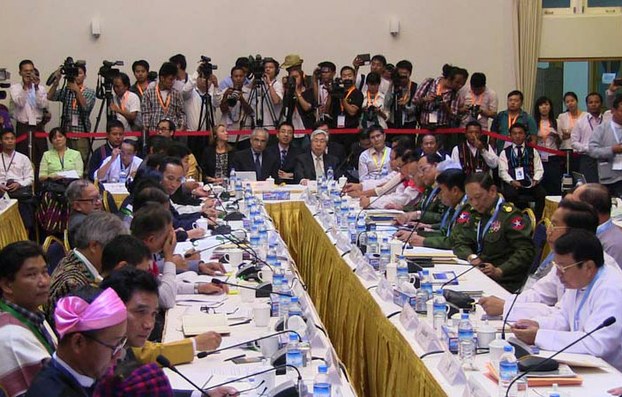Final peace deal eludes Myanmar government and armed ethnic groups
| Publisher | Radio Free Asia |
| Publication Date | 24 July 2015 |
| Cite as | Radio Free Asia, Final peace deal eludes Myanmar government and armed ethnic groups, 24 July 2015, available at: https://www.refworld.org/docid/55e59c7815.html [accessed 1 June 2023] |
| Disclaimer | This is not a UNHCR publication. UNHCR is not responsible for, nor does it necessarily endorse, its content. Any views expressed are solely those of the author or publisher and do not necessarily reflect those of UNHCR, the United Nations or its Member States. |
2015-07-24
 Armed ethnic groups meet with government peace negotiators at the Myanmar Peace Center in Yangon, March 17, 2015. RFA
Armed ethnic groups meet with government peace negotiators at the Myanmar Peace Center in Yangon, March 17, 2015. RFA
The latest round of peace talks between Myanmar's government and armed ethnic groups ended Friday without finalizing a nationwide peace accord, due to disagreement over the exclusion of six rebel groups and ethnic-proposed amendments, negotiators said.
The Union Peace Working Committee (UPWC), the government's negotiating team, failed to agree on the number of armed ethnic groups that will sign the final nationwide cease-fire agreement (NCA). The government wants to sign the accord with 15 groups.
But UPWC representatives rejected six armed groups that ethnic leaders suggested be included in the final NCA, an attempt to put an end to long-running conflicts in the multi-ethnic former British colony.
The government does not recognize the Ta'ang National Liberation Army (TNLA), the ethnic Kokang's Myanmar National Democratic Alliance Army (MNDAA) and the Arakan Army (AA) – all of which have had recent skirmishes with the Myanmar army. It also wants to exclude three smaller groups – the Wa National Organization (WNO), Lahu Army and Arakan National Council (ANC).
"If we ignore these armed groups, such as the Lahu Army and AA, because they are small armies, they could think they are being ignored because of their size," said Salai Lian Mong Sakong, a member of the special negotiation team set up by the armed ethnic groups. "Therefore, they would try to have bigger armies. We shouldn't leave out any group when signing the NCA. It would not be a solid NCA unless all groups signed it."
In the meantime, clashes between army troops and armed ethnic soldiers continued in Kachin, Shan and Kayin states.
"The groups that the government doesn't want to include in the signing of the final NCA are not from these states," said Sai Nyunt Lwin, a lawmaker from the Shan Nationalities Democratic Party. "We see that the government army is engaging in this fighting intentionally, not accidentally."
Areas of disagreement
The two sides agreed on 10 of the 13 amendments proposed by the ethnic groups and decided to resume negotiations, which have been going on for more than 18 months, during the first week of August.
The issues include disarmament, demobilization and reintegration, natural resource management, and whether President Thein Sein and the legislature can be signatories to the peace accord, according to a report by the online journal The Irrawaddy.
Mya Aye, a spokesperson from the 88 Generation student group, said that although only a few points required further discussion between the two sides, the fighting in Myanmar's northernmost state of Kachin could reverse the peace process.
The ethnic groups also want international representatives to witness the signing of the NCA, which the government opposes.
But Hla Maung Shwe of the technical support group the Myanmar Peace Center said during the past two days of talks at the Myanmar Peace Center in Yangon, the two sides could only agree on changing some points and wording in the draft NCA they signed in late March.
The government team, led by chief negotiator Aung Min, who is minister of the President's Office, would discuss the outstanding issues in the near future, he said.
"I think we can sign the final NCA during August," said Khin Maung Swe, a lawmaker from the National Democratic Force party. "If we can't sign it then, our efforts will have been wasted.'
The government wants a signed peace accord in place by the Nov. 8 general elections, so that Myanmar can move forward with political dialogue.
"We won't be able to hold elections in many places if we don't sign the NCA before [Nov. 8]," said Saw Than Myint of the Federal Union Party. "The Union Election Commission could cancel the holding of elections in some townships for security reasons. But if it does that, people in these places will lose their chance to vote, especially those who live in ethnic states that are unstable. We also would have fewer members of parliament from these states in the National Assembly."
CSOs send letter
In a related development, more than 100 rights groups sent a letter on Friday to Thein Sein and Senior General Min Aung, commander-in-chief of Myanmar's armed forces, urging them to end the military offensives in Kachin state.
The civil society organization said they are facing difficulties in trying to help the more than 1,000 people who have been affected by fighting in Sumbrabon township.
Rights activist Theinni Oo said township residents had nowhere to go because 17 government battalions were deployed around them.
"They are in danger," she said. "That's why we have demanded that the president and army chief stop the fighting in this area and hold peace talks with all ethnic groups."
Khun Jar of the Kachin Peace Network said more than 2,000 people from the township were living in refugee camps as a result of the fighting, joining 120,000 others in the country, who also have been displaced by hostilities between government troops and ethnic armies.
Reported by Wai Mar Tun, Khin Khin Ei, Kyaw Lwin Oo, Kyaw Zaw Win and Zarni Tun for RFA's Myanmar Service. Translated by Khet Mar. Written in English by Roseanne Gerin.
Link to original story on RFA website
